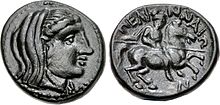Manto (daughter of Tiresias)
In Greek mythology, Manto (Ancient Greek: Μαντώ) was the daughter of the prophet Tiresias and mother of Mopsus.[1] Tiresias was a Theban oracle who, according to tradition, was changed into a woman after striking a pair of copulating snakes with a rod, and was thereafter a priestess of Hera.[2]

Mythology[edit]
During the War of the Epigoni, a later myth relates, Manto was brought to Delphi as a war prize. Apollo made her his priestess and sent her to Colophon to found an oracle devoted to him. She had a son named Mopsus by Apollo,[3][4] although by some accounts, the father of Mopsus is Rhacius, whom Manto later married. According to the Bibliotheca, she had two children by Alcmaeon, Amphilochus and Tisiphone. In an early version, Apollo instructed her to marry the first man she saw outside of Delphi (who turned out to be Rhacius). Rhacius then took her to Claros (which, like Colophon, is in western Asia Minor) and there she founded the oracle of Apollo Clarios. When she arrived, Manto wept bitter tears for her ravaged city. As they fell in the ground, the tears transformed into a spring.[5]
In Roman myth, Manto went to Italy and gave birth to Ocnus (father: Tiberinus, the genius of the river Tiber). Ocnus founded Mantua and named it after his mother. It was said that Manto's abilities in prophecy were much greater than her father's.
Manto also appears in the myth of Niobe, the boastful queen of Thebes who degraded Leto. Manto warns her not to anger the gods and suggests she ask for Leto's forgiveness. Niobe refuses and continues to insult Leto, and consequently is punished by Apollo and Artemis.[6]
Lampus, who tried to violate Manto on her couch, was killed by Apollo for this act.[7]
She is one of the fortune-tellers and diviners whom Dante sees in the fourth pit of the eighth circle of the Inferno.[8]
See also[edit]
Notes[edit]
- ^ Boccaccio, Giovanni (2003). Famous Women. Harvard University Press. ISBN 9780674011304.
- ^ Bell's New Pantheon; Or Historical Dictionary of the Gods, Demi-gods, Heroes ... J. Bell. 1790.
- ^ Apollodorus, Bibliotheca E6. 3
- ^ Strabo, Geography 14. 5. 16
- ^ Hard, Robin (2004). The Routledge Handbook of Greek Mythology: Based on H.J. Rose's "Handbook of Greek Mythology". Routledge. p. 331. ISBN 0-203-44633-X.
- ^ Ovid, Metamorphoses 6
- ^ Statius, Thebaid 7
- ^ "Circle 8, subcircles 1-6, cantos 18-23". The University of Texas. Retrieved 11 April 2012.
References[edit]
- Apollodorus, The Library with an English Translation by Sir James George Frazer, F.B.A., F.R.S. in 2 Volumes, Cambridge, MA, Harvard University Press; London, William Heinemann Ltd. 1921. ISBN 0-674-99135-4. Online version at the Perseus Digital Library. Greek text available from the same website.
- Publius Ovidius Naso, Metamorphoses translated by Brookes More (1859-1942). Boston, Cornhill Publishing Co. 1922. Online version at the Perseus Digital Library.
- Publius Ovidius Naso, Metamorphoses. Hugo Magnus. Gotha (Germany). Friedr. Andr. Perthes. 1892. Latin text available at the Perseus Digital Library.
- Publius Papinius Statius, The Thebaid translated by John Henry Mozley. Loeb Classical Library Volumes. Cambridge, MA, Harvard University Press; London, William Heinemann Ltd. 1928. Online version at the Topos Text Project.
- Publius Papinius Statius, The Thebaid. Vol I-II. John Henry Mozley. London: William Heinemann; New York: G.P. Putnam's Sons. 1928. Latin text available at the Perseus Digital Library.
- Strabo, The Geography of Strabo. Edition by H.L. Jones. Cambridge, Mass.: Harvard University Press; London: William Heinemann, Ltd. 1924. Online version at the Perseus Digital Library.
- Strabo, Geographica edited by A. Meineke. Leipzig: Teubner. 1877. Greek text available at the Perseus Digital Library.


 French
French Deutsch
Deutsch

